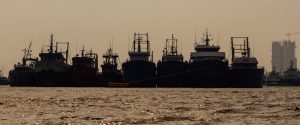The Bangladesh government has officially called off the development of a deep-sea port at Sonadia Island off the country’s southeastern coast.
With this, the high-profile project on the Bay of Bengal, which would have further enhanced China’s economic and strategic ambitions in the Indian Ocean region, has been given a formal burial.
Apparently, environmental concerns drove the Bangladesh government’s decision to scrap the project. A deep sea port at Sonadia would have harmed the area’s biodiversity, Cabinet Secretary Khandker Anwarul Islam told reporters.
Instead, a deep-sea port will be built at Matarbari, 25 kilometers away from Sonadia, he said.
While environmental issues may have been among the factors that Dhaka had to consider, it is more likely that geopolitics sealed the fate of the project. The India-China contest for influence in Bangladesh seems to have sunk plans for a deep-sea port at Sonadia.
The idea of a deep-sea port at Sonadia was first conceived in 2006. China agreed to construct the port as well as providing loans to finance the project. The Bangladeshi and Chinese governments were to sign the framework agreement during Prime Minister Sheikh Hasina’s visit to Beijing in July 2014, but that didn’t happen. Despite China’s continuing interest in the port project it didn’t feature on the agenda during President Xi Jinping’s 2016 visit to Dhaka.
Over the past six years, Bangladeshi officials have repeatedly stated that the project had been scrapped but the government did not take any formal steps to signal the termination of the project.
That has now changed. At a cabinet meeting in late-August, the Hasina government formally revoked the Sonadia Deep Sea Port Authority Act 2012 and announced the cancellation of the project.
Bangladesh was keenly interested in a deep-sea port at Sonadia. Existing ports at Chittagong and Mongla are not only congested but also have a shallow draft. Consequently, ships of higher tonnage cannot dock at these ports. At present, such ships are forced to offload their cargo at transshipment hubs in Sri Lanka and Singapore, before smaller vessels bring the consignments to Bangladesh. This results in delays and increases trading costs.
A deep-sea port was expected to cut such costs, provide a fillip to Bangladesh’s trade and also pave the way for its emergence as a regional trans-shipment hub for landlocked countries like Bhutan and Nepal as well as for India’s northeastern states and China’s Yunnan province. A feasibility study conducted by Japan in 2006 indicated that Sonadia was the best location for a deep sea port.
So, why did Bangladesh decide to scrap the project? New Delhi was reportedly opposed to Chinese involvement in the Sonadia project, given its location in the Bay of Bengal and its geographic proximity to India.
There are apprehensions in India that as in Sri Lanka, China could pressure Dhaka to hand over strategic infrastructure should it be unable to repay loans. Such a scenario, New Delhi feared, would have negative implications for India’s security.
However, Bangladesh has been careful borrower so far, taking care not to opt for projects that are not in keeping with its national priorities. It has avoided riling India, too, by not involving China in infrastructure projects that could have security implications for India.
Bangladesh has adopted a cautious infrastructure development strategy, which involves drawing on the financial support and technical expertise of a number of countries in order to avoid becoming over-dependent on any single nation. Thus, although it is an important partner in China’s Belt and Road Initiative, it is simultaneously partnering with several China-wary countries, including the U.S., India, Japan and South Korea, to limit Beijing’s influence.
The deep-sea port that Bangladesh is building now at Matarbari will proceed with Japanese help. Like Sonadia, this is located on the Bay of Bengal and close to India. However, given the strong India-Japan relationship, New Delhi is unlikely to raise objections. Work on the port has already begun.
Bangladesh will therefore get its first deep-sea port by 2025 – but it will be funded and built by Japan, not China.

































